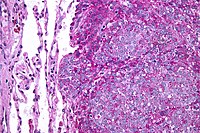
Photo from wikipedia
Bone is the second most frequent site of metastasis for hepatocellular carcinoma (HCC), which leads to an extremely poor prognosis. HCC bone metastasis is typically osteolytic, involving the activation of… Click to show full abstract
Bone is the second most frequent site of metastasis for hepatocellular carcinoma (HCC), which leads to an extremely poor prognosis. HCC bone metastasis is typically osteolytic, involving the activation of osteoclasts. Long non-coding RNA H19 plays an important role in the pathogenesis of human cancers. Nonetheless, the mechanism underlying the participation of H19 in HCC bone metastasis remains unclear. The current study established a mouse HCC bone metastasis model by using serial intracardiac injection and cell isolation to obtain cells with distinct bone metastasis ability. H19 was highly expressed in these cells and in clinical HCC bone metastasis specimens. Both osteoclastogenesis in vitro and HCC bone metastasis in vivo were promoted by H19-overexpression, whereas these processes were suppressed by H19-knockdown. H19-overexpression attenuated p38 phosphorylation and further downregulated the expression of osteoprotegerin (OPG), also known as osteoclastogenesis inhibitory factor (OCIF). However, upregulated OPG expression as well as suppressed osteoclastogenesis procedure caused by H19-knockdown was recovered by p38 interference, indicating that p38MAPK-OPG contributed to H19-promoted HCC bone metastasis. Furthermore, we demonstrated that H19 inhibited the expression of OPG by binding with protein phosphatase 1 catalytic subunit alpha (PPP1CA), which dephosphorylates p38. SB-203580-mediated inactivation of p38MAPK reversed the downregulation of HCC bone metastasis caused by H19 knockdown in vivo. Additionally, H19 enhanced cell migration and invasion by upregulating zinc finger E-box binding homeobox 1 (ZEB1) via the sequestration of miR-200b-3p. Conclusion: H19 plays a critical role in HCC bone metastasis by reducing OPG expression, which is mediated by the PPP1CA-induced inactivation of the p38MAPK pathway, and H19 also functions as a sponge for miR-200b-3p.
Journal Title: Hepatology
Year Published: 2020
Link to full text (if available)
Share on Social Media: Sign Up to like & get
recommendations!